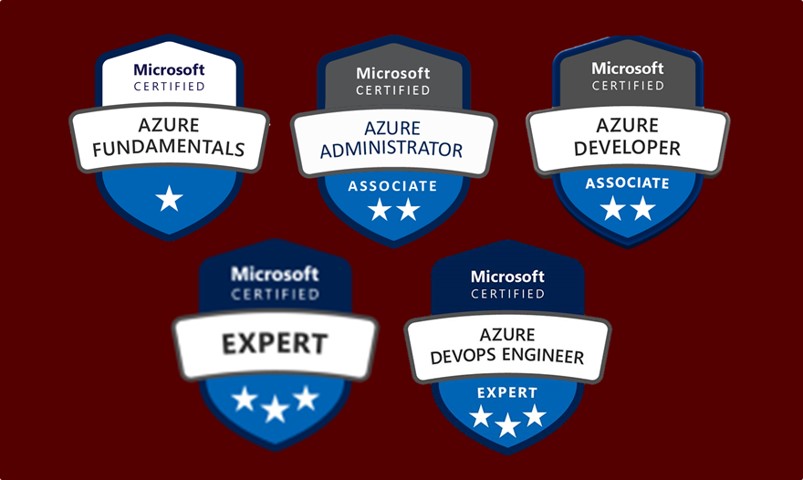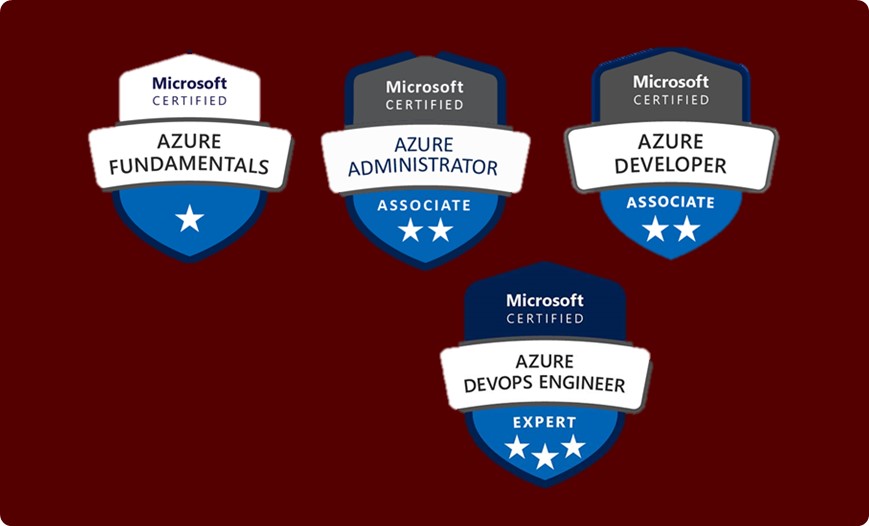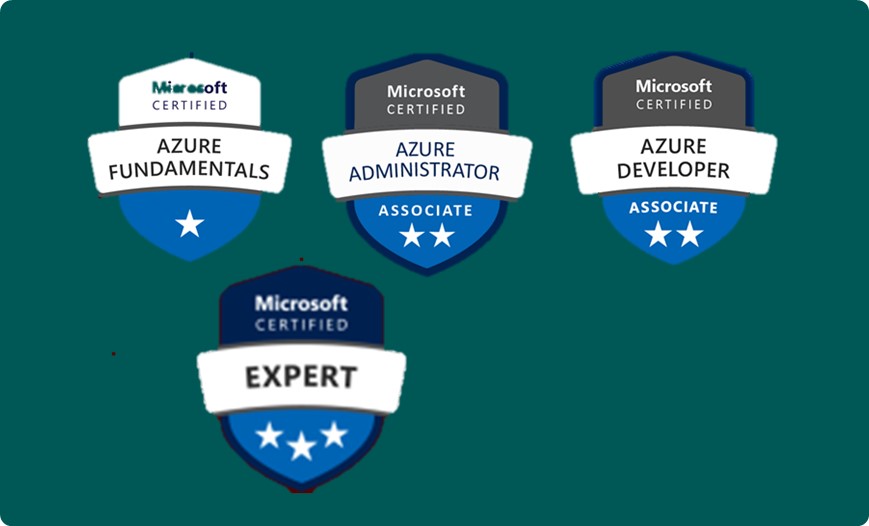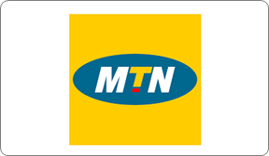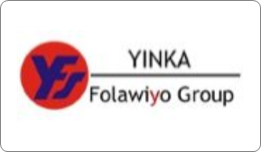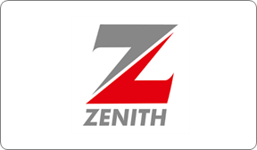Microsoft Azure Administrator Certification Training | AZ 104 Certification
- Unlimited Access to Live Training
- Understanding Microsoft Azure Offering IaaS, PaaS, SaaS
- Learn to migrate your project to Azure cloud
- Learn to build .apps using integrated tools
- Discuss Case Studies and Interview Q&A
- Learn from Microsoft MVPs and Technical Consultant
- Get access to DotNetTricks Membership
- Get Access to Interview preparation sessions
- Resume review and Resume Building Pro tips
- Learn to pass Azure certification exam AZ-104

Live Sessions
1 Yr. Membership

Skill Level
Beginner

Career Coaching
Weekly Session

Course Durations
4 Weeks

Assignment
20 Hours
Instructor-led Live Online Classes
Our learn-by-building-project method enables you to build practical or coding experience that sticks. 95% of our learners say they have confidence and remember more when they learn by building real world projects which is required to work in your real life.
| July 9th | Microsoft Certified - Azure Administrator AZ 104 Certification | SAT, SUN | SOLD OUT 3PM to 6PM |
| Aug 13th | Microsoft Certified - Azure Administrator AZ 104 Certification | SAT, SUN | FILLING FAST 3PM to 6PM |

Microsoft Azure Related Courses
Why Learn Azure?
OPPORTUNITY
Public cloud spending alone will grow to $522B in next few years.
SALARY TRENDS
The average salary of Azure administrator is $105k (based on Indeed.com salary data).
PERFORMANCE
More than 83% websites will be cloud based within the next three years - Cisco.

SECURED FUTURE
By 2026, 90% of enterprises will use both the IaaS and PaaS capabilities from cloud provider.
USED BY INDUSTRIES
3M, Heineken, NBC Sports, Citrix, UST Global, Mindtree, TCS, Wipro, Infosys & many MNC's worldwide use Azure across industries.
Azure Administrator Certification Training Overview
The curriculum has been designed to earn Microsoft Azure Administrator Associate Certification (AZ-104). You can check the examination details and certification cost at Azure Fundamentals AZ-104
01. Configure and deploy virtual machines
02. Manage virtual machine workloads, networks, disks, and storage
03. Configure and deploy virtual machines through scripts.
04. Configure, deploy, and manage application services.
05. Manage Azure storage offerings - blobs, Azure files and recovery services.
06. Integrate Azure Active Directory
07. Implement recovery services
08. Monitoring Azure services on Azure.
09. Prepare to you for Microsoft Azure Administrator Associate (AZ-104 Exam)
"The Cloud" word has influenced career growth of as many if not yet it will impact you sooner or later whether you are a .Net developer, a widow’s system administrator, a SQL DBA, or an IT manager. Azure becomes the must-have skills for IT professionals as your azure cloud skills will help an organization to analyze, evaluate, manage, scale & optimize IT infrastructure offering & cost. As Microsoft Azure is open-source, hybrid & Secure of offers ever-expanding cloud platform that’ have a massive global network for future business for an organization.
Generally, this training course is the most suitable one for IT administrators, network engineers/server engineers, IT professionals/application developers, .NET developers, solutions architects/team leads, and DevOps engineers. To pursue this training, the candidate must know about infrastructure topics such as active directory, networking, and PowerShell. Also, he/she must be familiar with tools/SDK/IDE, Visual Studio 2019, and Azure SDK.
01. We Supports one-to-one training and corporate training 02. All sessions are delivered by expert mentors based on real-life examples 03. Live training membership offers unlimited access to all the live training as well as recorded courses from us 04. The course can be accessed from anywhere, using any device 05. It comes with the online support team that solves your technical queries regarding Microsoft Azure Administrator during the course 06. On the successful completion of this course, candidates will get a course completion certificate.
To stay competitive in the IT field, the cloud is certainly an essential skill set. The Azure Administrator Associate certification is for those individuals willing to improve their career growth and to get a new role as an Azure cloud administrator. Excelling in this course guarantees an increment in the pay.
Skills Covered
Managing Azure subscriptions
Access Control Lists
Deploying and Organizing Azure Resources
Implementing, Managing, and Securing Storage
Integrating, Securing, and Managing Identities
Building, Managing, and Executing Virtual Machines
Azure Site Recovery
Implementation of Virtual Networks
Implementing Multi-Factor Authentication
Azure monitoring
Azure CLI
Tools Covered
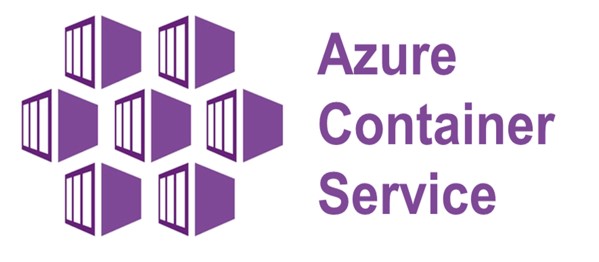
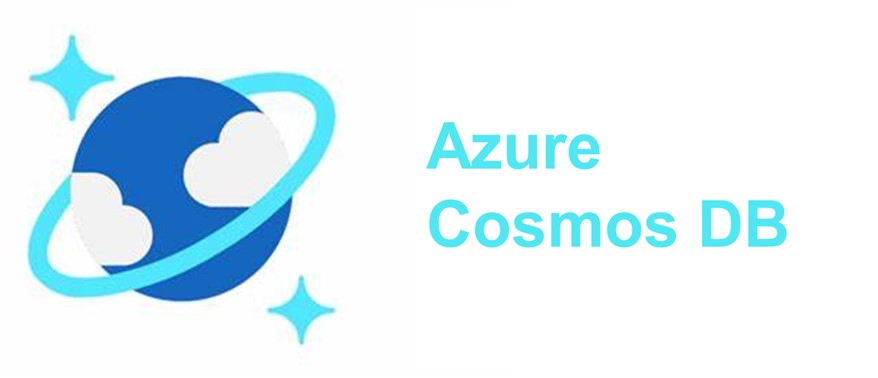

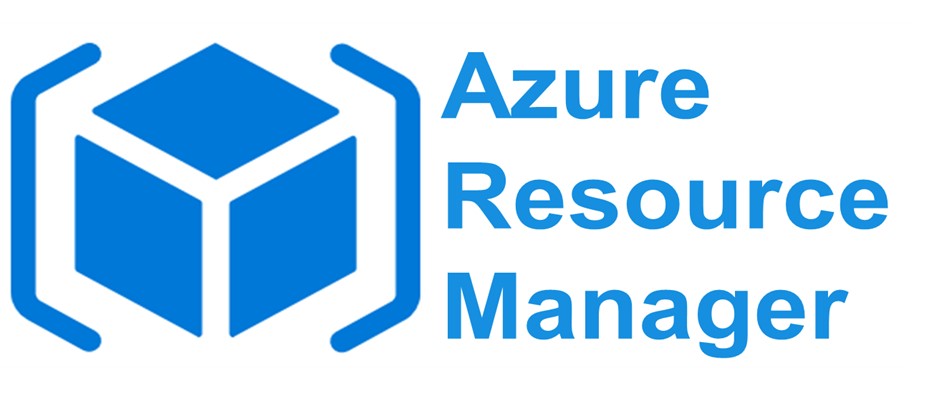
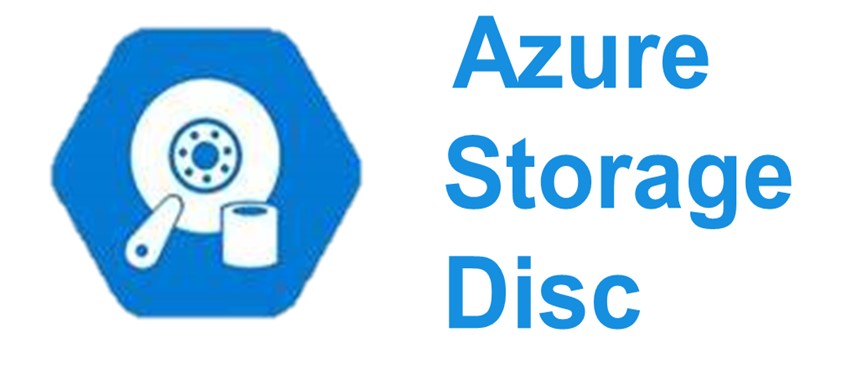
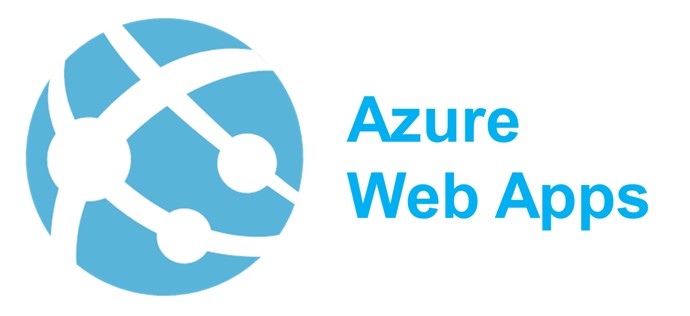
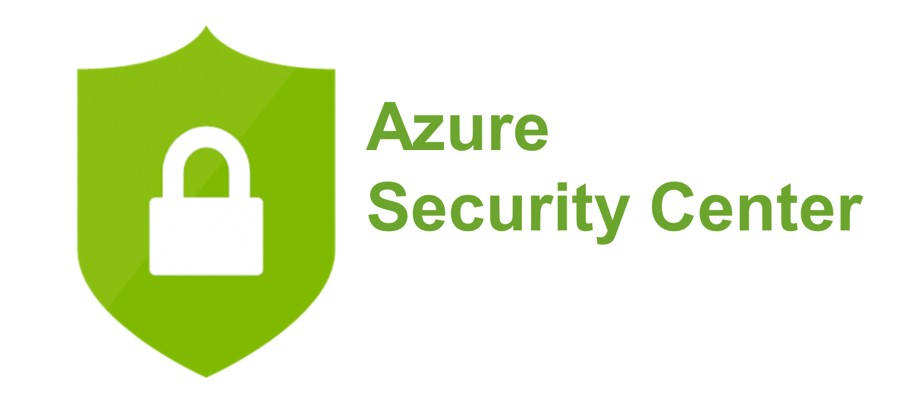
Microsoft Azure Administrator Course Contents
01. Introduction to Cloud Computing
02. Overview of Microsoft Azure
03. Microsoft Azure Services
04. Azure Subscriptions
05. Management Groups
06. Azure Resource Manager
07. Azure Portal and PowerShell
08. Azure Resource Manager Policies
09. Azure Policy Definition Structure
10. Resource Management Locks
11. Organizing Azure Resources
Hands-On
01. Create an Azure account
02. Manage subscriptions, billing, and policies
03. Configure Management Groups
04. Use Portal and PowerShell to deploy and manage resources on Azure
05. Create Azure policies
01. Introduction to Azure Virtual Networks
02. IP Addresses – Public and Private
03. Classless Inter-domain Routing (CIDR)
04. Subnets
05. Network Interface Cards (NICs)
06. Network Security Groups (NSGs)
07. Network Security Group Rules
08. Virtual Network Service Endpoints
09. Service Endpoint Policies
10. Azure Load Balancer
11. Azure DNS
12. Azure Firewall
13. Azure Bastion Service
Hands-On
01. Create and Configure Virtual Networks
02. Setup Network Security Groups (NSGs)
03. Restrict Network Access to Resources with Service Endpoints
04. Implement Azure DNS
05. Configure Azure Firewall
01. Azure Virtual Machines
02. Azure Resource Manager VM
03. Introduction to ARM Templates
04. Create a Custom Image of Azure VM
05. Create a Managed Image of a Generalized VM
06. Create an Image from VM Snapshots
07. Creating a Linux Virtual Machine
08. Virtual Machine Extensions
09. Configuration Management using PowerShell DSC
10. Run Custom Scripts using Custom Script Extension
Hands-On
01. Create Windows VMs in the Azure Portal
02. Create Windows VMs with Azure PowerShell
03. Create VMs using ARM Templates
04. Deploy custom server images
05. Configure Azure Kubernetes Service (AKS)
01. Azure Storage
02. Azure Storage Replication
03. Azure Storage Explorer
04. Attach or Detach an External Storage Account
05. Shared Access Signatures (SAS)
06. Attach a Storage Account using SAS
07. Azure Blob Storage
08. Azure File Storage
09. Azure Queue Storage
10. Azure Table Storage
Hands-On
01. Create Azure Storage accounts
02. Manage storage using Azure Storage Explorer
03. Copy data by using AZ-Copy
04. Secure storage using SAS
05. Implement Blobs and Files storages
06. Implement Table storage
01. Azure Backup
02. Why Use Azure Backup?
03. Files and Folder Backup
04. Application Backup
05. Azure File Share
06. Azure File Sync
07. Content Delivery Network (CDN)
08. How CDN Works?
09. Azure Import/Export Service
10. Azure Data Box
Hands-On
01. Implement Azure Backup service
02. Create an Azure File Share
03. Implement Azure File Sync
04. Store and access data using Azure CDN service
05. Transfer data using Azure Import/Export service
01. Azure Virtual Machine Storage
02. Azure Virtual Machine Availability
03. Fault and Update Domains
04. Azure Load Balancer
05. Automatic Scaling of Azure VMs
06. VM Scale Sets
07. Azure VM Backup
08. Azure VM Monitoring with Azure Diagnostics
09. Extension
10. Azure Advisor
Hands-On
01. Attach a Managed Data Disk to a Windows VM
02. Initialize a New Data Disk
03. Configure Azure Load Balancer
04. Create a VM Scale Set
05. Implement Backup and Restor
e 06. Enable Diagnostic Extension to Monitor Metrics and Logs
01. Azure Traffic Manager
02. Azure Application Gateway
03. Azure Virtual Network Routing
04. Azure Virtual Network Connectivity
05. Azure VPN Gateway
06. BGP with VPN Gateway
07. Virtual Network Peering
Hands-On
01. Implement Azure Traffic Manager
02. Configure Virtual Network Gateways
03. Configure BGP with Azure VPN Gateway
04. Implement Virtual Network Peering
01. Azure Inter-site VPN Connectivity Methods
02. Site-to-Site VPN Gateway Connection
03. Point-to-Site VPN Gateway Connection
04. VNet-to-VNet Connections
05. Azure ExpressRoute
06. Azure Virtual WAN
07. Azure Network Watcher
08. Resource Troubleshooting in Azure Network Watcher
Hands-On
01. Create and Configure Point-to-Site Connection
02. Configure Vnet-to-Vnet Connection
03. Configure Azure ExpressRoute
04. Configure Azure Virtual WAN
05. Implement Network Watcher
01. 01. Overview of Role Based Access Control
02. Azure Monitor
03. Log Analytics
04. Azure Activity Log
05. Alerts in Azure Monitor
06. Custom roles in Azure
07. Provide access to Azure resources by assigning roles
08. Manage multiple directories
Hands-On
01. Manage Access using RBAC
02. Grant Access for a Group using RBAC
03. Configure Activity Log Alerts
04. Create a custom role
01. Identity Access Management
02. Azure Active Directory
03. Multi Factor Authentication
04. Self-Service Password Reset
05. Azure AD Identity Protection
06. Azure AD Conditional Access
07. Azure AD Domains and Tenants
08. Azure AD Domain Services
09. Azure AD Join
10. Azure AD Single Sign-On
11. Manage Azure AD Objects
Hands-On
01. Configure Self-Service Password Reset
02. Implement Azure AD Identity Protection
03. Configure Domains and Tenants, Users and Groups
04. Enable Azure AD Domain Services
01. Hybrid Identity
02. Password Hash Synchronization (PHS)
03. Pass-through Authentication (PTA)
04. Federated Authentication
05. Azure AD Seamless Single Sign-On (SSO)
06. Azure AD Application Proxy
07. Password Writeback
Hands-On
01. Implement Password Hash Synchronization and Pass-through Authentication
02. Implement App Proxy and Password Writeback
03. Configure user accounts for Multi-Factor Authentication
AZURE CLOUD ADMINISTRATOR
SALARIES & JOBS AVAILABILITY For Azure Administrator Jobs Pay per Year?
Most Popular Jobs Similar to Azure Administrator
- Azure Solutions Architect
- Azure Synapse Analytics
- Azure Developer
- Azure Fundamentals
- Azure Data Factory
- Azure Administrator
- Azure Security Engineer
- Azure Architect
- Azure Cloud Engineer
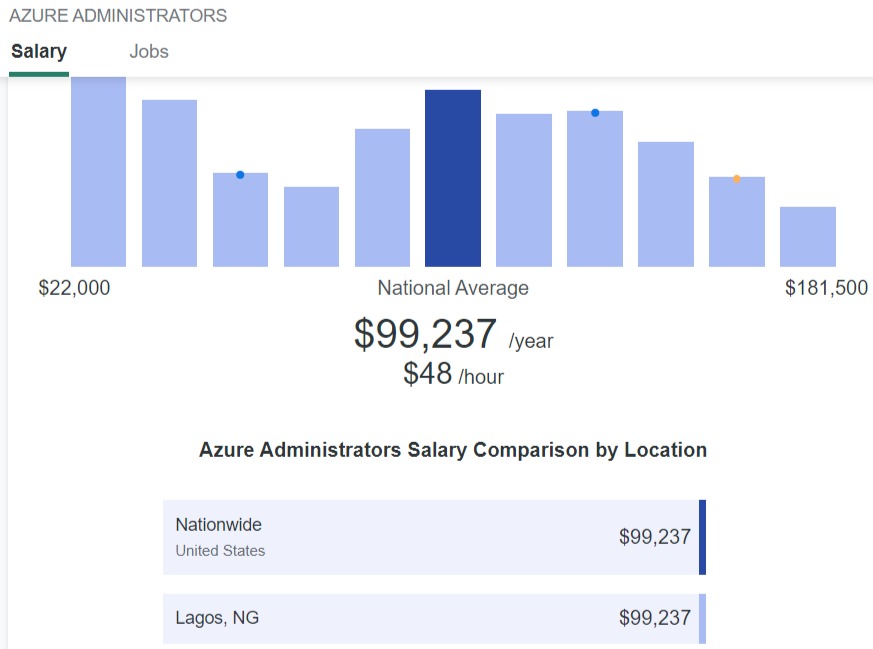
Most Popular Azure Administrator Job Categories
- Microsoft DevOps Engineer
- Microsoft Azure DevOps
- Azure Infrastructure Engineer
- Microsoft Azure Fundamentals
- Enterprise Administrator
- Azure Database Administrator
- Azure API Management
- Azure Sales
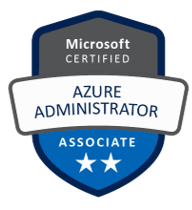
GreaterHeight Academy Benefits
Unlimited Live Sessions
Live Training Membership give you unlimited access to all our live training and sessions recording from anywhere and using any device staying at home.
Expert-led Live Sessions
All sessions are led by our expert mentors who are well connected to the open-source communities. They explain complex technical concepts in an easy way.
Test and Quizzes
Each Module will be followed by mock-up tests and quizzes which help you to monitor your learning progress and evaluate yourself.
Build Real-Projects
All the sessions are delivered using real-life. You will learn how to build real projects using industry recommended principles & practices.
Personal Career Coach
Get career guidance from top experts as your personal coach, align your preparation strategy & learning resources to achieve your goal.
Interview Prep Sessions
Get career guidance and ask your questions & doubts live. Join to prepare yourself for next job interview to crack and get hired!
Resume Building
Optimize your resume with the help of our experienced experts to get your desired jobs.
Hands-on Assignments
Learn by doing hands-on to gain confidence to solve real-world challenges and assignments. Interview Prep Sessions.
Discord Community Accessh
Get access to Discord community to discuss doubts, access assignments and learning with peer interaction.
Technical Support
We have online support team available to help you with any technical queries you may have during the course.
Get Certified
Master in-demand job skills to become a technology expert, get certified, and accelerate your career.
Microsoft Azure Developer Online Training Projects
Practice Essential
Tools
Designed By Industry
Experts
Get Real-world
Experience
Apply your coding skills to solve real-world problems. You’ll learn how to start a project from scratch by following recommended architecture, practices and deploy to server.
Project 1
In this project, get hands-on learning in how to implement a new architecture to the company’s website based on the requirements given for application gateway, storage accounts and configuring traffic manager for the same.
Building a dashboard to monitor your company’s website which is running on a web app.
Monitoring a website with Azure has been included in the project wherein you will build a dashboard. Also, use Azure metrics and monitor for managing the organization’s website which is running on a web application.
Case Study 01: Introduction to Cloud Computing.
Solving the issue of not wanting the corporation’s confidential data on the cloud while migrating to Microsoft Azure. Here, all the resources are governed and tracked costing and billing is being performed separately.
Case Study 02: Microsoft Azure Storage
The project involves solving latency issues & difficulty in accessing common files and tools & perhaps eases the upload of static content to Azure storage. Here, the candidate will create and configure a CDN endpoint
Case Study 03: Azure Virtual Machines
This project has been included as a part of the training to allow you to manage scaling requirements using scale sets and use a custom image to create a Virtual Machine. Also, automate the scaling of Virtual Machines as required.
Case Study 04: Microsoft Azure networking.
In this hands-on project, learn to create a Vnet with multiple subnets & deploying virtual machines within it. Establishing a connection between these subnets & enabling the resources within them to communicate privately.
Case Study 05: Load balancing and Network watcher
Successfully set up a load balancer for the backend resources. Also, it is suggested to ensure that the setting is such that a single frontend IP is exposed, and a network watcher is available to generate alerts in the Azure portal.
Case Study 06: Access management in Azure.
Adding users to the organization’s custom active directory domain and providing access to some of the services managed by them. The password authentication method and MFA must be set up with a verification option.
Career & Certifications
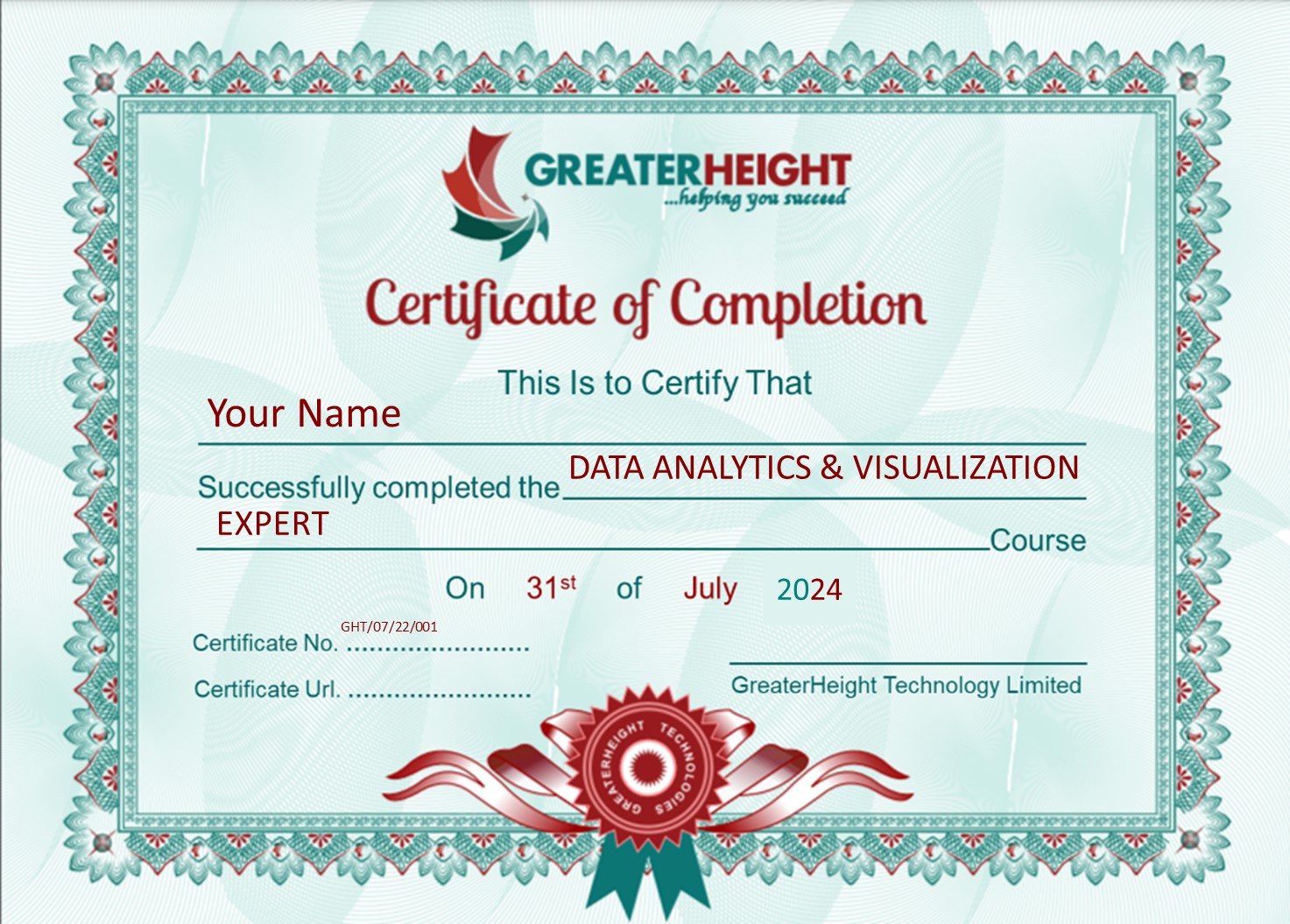
The Microsoft Azure training will help you do that and give the opportunity to work with industry-based projects to give you practical experience. With the help of this course and our course instructors, you will become capable of clearing the exam and becoming a Microsoft Certified Azure Administrator Associate in a well-known organization.
- Choose the best suitable cloud technologies and providers
- Configure and support cloud systems
- Set up private clouds
- Manage permissions, patches, and service deployments
- Build policies for cloud systems
- Manage cloud resources and network performance
- Manage identities and governance in Azure
- Implement and monitor storage
- Deploy and monitor compute resources of Azure
- Configure and monitor virtual networking
- Manage and backup Azure resources
FAQs
- Azure Fundamentals
- Azure Data Engineer
- AZ-204 Azure Developer
- Azure Masters
- Azure Solutions Architect
- Masters in Azure
- Azure DevOps
- Exam name: Microsoft Azure Administrator Associate
- Exam code: AZ-104
- Duration: 120 minutes
- No. of questions: 40-60
- Type of questions: Multiple-choice and multiple response
- Passing score: 70 out of 1000
- Azure DevOps
You will work on highly exciting projects in the domains of high technology, ecommerce, marketing, sales, networking, banking, insurance, etc. After completing the projects successfully, your skills will be equal to 6 months of rigorous industry experience.
- Azure Virtual Machines,
- Azure Storage,
- Azure File Storage and Blob Storage,
- Azure Table Storage,
- Azure CDN,
- Azure Network,
- Azure Web Apps,
- Azure SQL Database,
- Azure Backup,
- Azure Active Directory

Download the Course Curriculum to view the course contents at your leisure time!
Enroll Now for any of the courses and Get 10% off on our promo!
If you need clarification on your career path and you want to speak with a career counsellor, please get in touch with us.
OUR CLIENTS
We Have Worked With Some Amazing Companies Around The World
Our awesome clients we've had the pleasure to work with!


